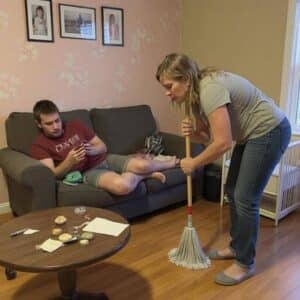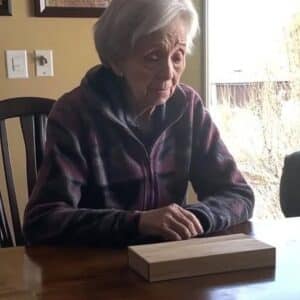They say it takes a village to raise a child.
I was the whole damn village.
My name’s Kristen. I’m sixty now—though some mornings, my knees say I’m closer to eighty. And on the loneliest days, I feel like I’ve aged a decade in a single night. Especially when I wake from dreams of Claire—my daughter, once small enough to sleep on my chest—only to remember she’s someone’s mother now.
I raised Claire alone. Her father left when she was three—walked out on a Tuesday morning like he was late for a meeting, didn’t even shut the door. No note, no explanation, just the smell of rain on concrete and the ghost of his absence hanging in the hall.
There was no support. No cards. Not even a pity phone call on her birthdays. So, I did it all. I became the bedtime reader, the nurse, the breadwinner, the disciplinarian, the one who clapped too loud at school plays and sat through every off-key solo like it was Broadway. I sewed her prom dress by hand with thread bought using food coupons. I went without, more times than I could count, so she never had to feel the scarcity I carried in my bones.
She was brilliant. Still is. College on a scholarship. Graduated with honors. I cried so hard at her graduation that I nearly choked on my own joy.
Then came Zach.
He was neat. Polished. Conservative in the way some men are—rigid smiles, cold compliments. Claire brought him home once, and he called my little one-bedroom house “cozy,” which is a polite way of saying “not enough.”
When they got married, no one asked how I felt. I wore a blue dress and smiled for pictures, while Zach offered me backhanded lines like, “You must be proud. It’s impressive, given the circumstances.”
Claire’s circumstances were me. And yet, somehow, I didn’t make the cut when they started their family.
When Jacob was born—my first grandson—she sent me a single photo. No text. Just his tiny face in a blue blanket. His nose looked like hers. His chin, like mine. I sat down on the bed and sobbed into a pillow, overwhelmed by joy and grief at once.
I offered to help. Of course I did. To cook, to clean, to let her sleep while I rocked him in my arms. But there was a pause. A hesitation.
Then came the call.
Her voice was brittle, scripted. She said Zach thought it wasn’t “healthy” for Jacob to grow up around “certain family models.”
“What does that mean?” I asked, though I already knew.
“He doesn’t think single motherhood should be… normalized.”
That was all. She hung up. No “Mom.” No “I love you.” Just a dead line and the echo of shame.
I walked into the guest room—the nursery I had prepared. I had painted the walls soft sage. I’d found an old rocker and reupholstered it myself. A hand-knit blanket hung over the crib, a silver rattle polished and ready. A college bond tucked away in the drawer, built from spare change and hope.
I sat on the floor and let myself cry. Then, I packed it all in a box.
The next morning, I drove across town to the church pantry where I volunteer. That’s where I met Maya. Twenty-four, exhausted, with a baby girl named Ava. Laid off from her job. No partner. Her hands trembled when I handed her a cup of tea. She looked like someone who hadn’t eaten with both hands in weeks.
I gave her the box.
She blinked. “Why?”
“Because I remember what it feels like.”
She opened the blanket and cried. Then she handed Ava to me, whispering, “Just while I eat.”
So I rocked Ava and let Maya breathe. In that moment, I felt something unexpected: peace.
Three weeks passed.
Then Claire called.
She was unraveling. “He doesn’t help. He hasn’t changed a diaper. He said that’s not his role.”
She broke. “I’m doing it all alone, Mom.”
And I just listened. No judgment. No told-you-so. I let her speak her pain into the phone. The words spilled like water from a cracked dam.
Eventually, she whispered, “I didn’t want to become you. But now I understand what it cost you to be strong.”
I told her the truth.
“There’s a bed here. A hot meal. And a mother who’s never stopped loving you.”
She came home two days later.
Zach didn’t fight. He just shrugged. “This isn’t what I signed up for,” and handed her divorce papers through his lawyer.
Claire moved into the guest room—the one that had waited quietly, like I had. That first night, she didn’t talk much. She fed Jacob, changed him, and fell asleep on the couch while I rubbed her back like I used to.
She comes to church with me now. Maya does too. They sit on either side of me, their babies cooing. They pass diapers and smiles like lifelines.
Last Sunday, Claire offered to watch Ava while Maya napped upstairs.
“I know what it’s like to run on nothing,” she said. “You’re allowed to rest.”
And for the first time, I saw it: her strength, shaped like mine—but softened by healing.
There’s a man in the choir. Thomas. Widowed. Kind. Quiet. He carries diaper bags and granola bars in his coat pocket. He doesn’t flirt. He just listens.
Claire talks to him sometimes after service. No rush. No pressure. Just a kind man with kind eyes who makes her laugh again.
And me?
I rock Jacob in the same chair I once rocked Claire in. He curls his fingers around mine like he knows I’m his. Even if I wasn’t allowed in the room the day he was born, I’m here now.
Sometimes, I whisper to him while he sleeps.
“You won’t know how hard your mama fought for you. But one day, I hope you understand—love doesn’t always shout. Sometimes, it’s quiet. Patient. Unseen. But always here.”





